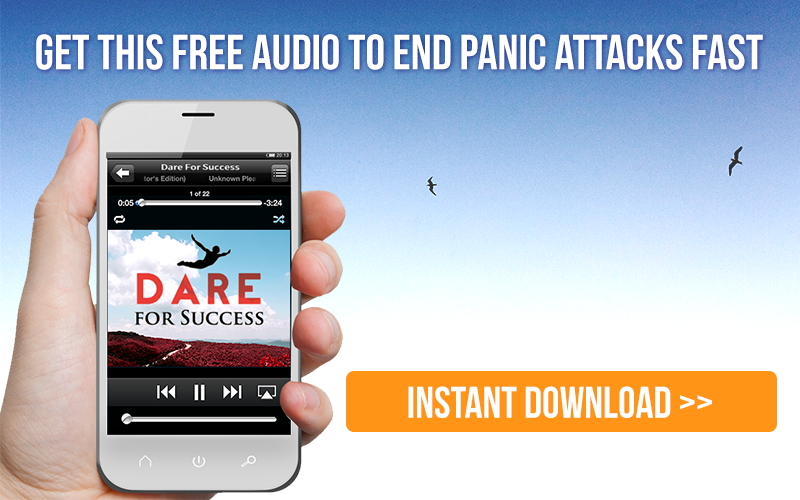How to end fear of flying
Flying is often an anxious experience for the average person, so it’s understandable that it poses a difficult challenge for a person with high anxiety and frequent panic attacks.
I’m going to demonstrate how to apply the 21 Second Countdown to conquer a fear of flying—so you’ll feel confident and safe within yourself while flying both long and short distances.
Most people who suffer from panic attacks generally don’t fear a mechanical failure in the aircraft, but rather a failure within themselves (i.e., an out-of-control episode of sheer panic while flying).
This is because people who experience panic attacks feel like they’re walking around with an internal bomb that could go off at any moment, sending them into a downward spiral of panic.
If this “internal bomb” goes off in a safe place, such as the home, it’s much easier to deal with because that environment is a safe zone in the person’s mind. Being thirty thousand feet in the air creates the dilemma of not feeling safe and comfortable in the environment.
An element of claustrophobia also often manifests itself with fear of flying. The person experiencing the anxiety frequently feels a need for more open space or somewhere to hide and be alone, away from other people.
If you’re affected by airplane anxiety, your initial attitude when you book your flight is important. Be excited that you have this opportunity. Remind yourself that while on the plane, you’ll have new techniques on hand to help you overcome your fear and enable you to fly to far away destinations.
Don’t worry—you’ll be perfectly safe on board.
Often, a carefree flight begins the night before. Try to ensure that you get some good rest before your departure. Fatigue can cause excess stress. On the day of the flight organize your schedule as best as possible, ensuring there’s no hassle getting to the airport, passing through customs, etc.
You can do this by giving yourself plenty of time. There’s no point in adding more stress to an already nervous trip simply because you have to rush through the airport at the last minute.
As you board the airplane, reaffirm the fact that should the anxiety manifest itself, it won’t damage you. As you’ve always done in the past, you’ll move through a period of anxiety unharmed, and being in an airplane doesn’t mean that you’re in a situation where these thoughts don’t apply. So here’s your new approach to flying.
You board the plane, not in the hope that you’ll feel relaxed and calm, but in the hope that you will experience the anxiety and have an opportunity to process it.
As always, the real trick to making this approach fully effective is to completely throw yourself into the experience. If you hold a thought that all feelings or sensations of anxiety are bad, then that will only terrify you more and make you feel less positive about flying.
Allow yourself to feel anxious and expect you will probably feel anxious some time before the flight.
Capt. Tom Bunn of the SOAR fear of flying course recommends anxious flyers should not hide their anxiety from the crew and to, in fact, request a short meeting with the pilot during boarding. He suggests that just a simple hello and a few words with the pilot can erase a large percentage of the fearful flyer’s anxiety.
Now take your seat and if you’re not feeling any of the familiar anxious sensations, ask them to make themselves felt while the rest of the passengers board. If the sensations are there, you want them to reveal themselves. You can do this because you’re not hiding or running away from them. You’re not sitting in your seat praying that they don’t appear.
Remember how you reacted before when they started becoming apparent? Most likely, you started to get anxious and thought about how being on a plane was the last place in the world you wanted to be. Those thoughts grew in momentum until you scared yourself witless, and this was even before the main cabin door was closed.
If, on the other hand, you feel nothing alarming, that’s fine. Begin to distract yourself with a magazine, a book, or music. But, to be sure, check your feelings regularly to see if there’s anything anxious lingering in the background.
By expecting that you may have a panic attack, you place yourself under less pressure when you start to feel anxious. There is a voice inside us that, when alerted to a potential panic attack, screams one of two things:
Please, God, not now. I can’t cope with this here. Red alert!
. . . or the positive and empowering
There you are. I was expecting you to show up. Well, show me what you’ve got. I’m ready, waiting, you have got 21 seconds.
So if you feel the beginnings of a panic attack, that’s fine. You were never trying to run away from it; in fact, you were hoping it would emerge so you could move through it.
The more you really demand to have an attack during the flight, the more empowered and confident you’ll feel in yourself. It can sometimes help to become a bit emotional or excited with the fear when you demand it to show itself, because this helps the emotions to release and flow. You may experience a hot flush when this happens.
It is expected to experience a rush of adrenaline on takeoff; notice that it has a wavelike effect. It courses through your body—and if you pay close attention, you’ll feel it pass quickly, in twenty or thirty seconds.
Nothing to fear here. After it passes, confidence returns—until the next wave comes, and the next, until eventually you notice the pattern. And, by not reacting, the effect on you is nothing more than bodily sensations minus the panic.
Learn more about how to treat anxiety in Panic Away.

“I no longer fear traveling for holidays”
Jackie called our office to talk about how Panic Away eliminated her anxiety while flying. Listen to the full message she left on our answering machine.
Click the play button below and wait for audio to start.
Play Audio 





Julian Grajczak
Thank you so much!! I’ve been waiting for someone like you to tell me those things!! I’m flying in a couple of weeks and I’ve been having a lot of trouble.
Elvie
Exactly what I needed… I will be flying a 16 hour flight in 2 weeks and this article helps! Thank you!!! I will print this out and read it again while I’m in the airport.
Hannah
Thankyou for this, I’m flying in a couple of months and am already worrying. Its not the fact I think something going to go wrong its just I get a dropping feeling in most vehicles so when the plane is taking off and going down this is when i’m worried i’m going to get that dropping feeling and start panicking.
Diamond
This is great!!! Thank you so much!!
Sue
Thank you so much Barry
Merry Christmas
God Bless you
Kind Regards
Sue Odrljin
Judy S.
what worked for me is to remind myself that God is in control, and that I am safe. His arms are around me. To Realize that I am not Stuck on the plane, with NO escape, as if He wanted me off the plane, He could get me off, or , if Need be, prevent me from going. The other strategy is to read and medidate on hope-filled, encouraging Bible verses. I also concentrate one. The Bible verses have God’ s calming power in them like No other book in the world. Lastly, I keep my mind busy, reading Guideposts, encouraging stories, 0r keep my mind busy talking to someone. if Negative thoughts return, I tell myself that nothing can happen today, that He doesn’t allow, and Since a panic attack is not His will, He will not allow it. It anything bad did happen, He would help me through it….to give me peace, and He would make something good out of that bad Situation, so what have I I fear? Last time I did this, I had no panic attack, and I owe it all to Jesus, who spoke to my heart to think, ‘positive thoughts.’ l will not have ar attack., I am safe, God’s arms are around me.”. The battle is won in the mind. AISO, take a wet cloth with you, to put on your neck, and a cup of ice, and take a hand-held fan with you. This helps Io prevent shock from one’s rising body temperature.